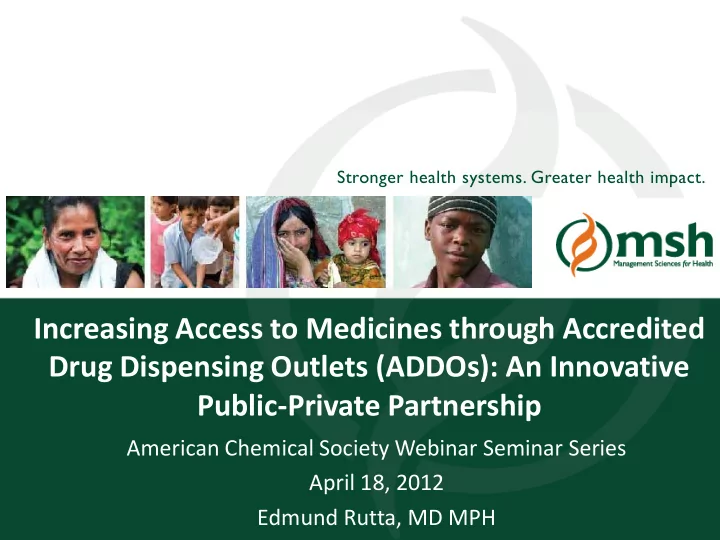

Stronger health systems. Greater health impact. Increasing Access to Medicines through Accredited Drug Dispensing Outlets (ADDOs): An Innovative Public-Private Partnership American Chemical Society Webinar Seminar Series April 18, 2012 Edmund Rutta, MD MPH Management Sciences for Health 1
Access to Medicines The World Health Organization considers equitable access to safe and affordable medicines as vital to the attainment of the highest possible standard of health by all. [Access to medicines-Statement 13 March 2009] Management Sciences for Health 2
Developing countries continue to face low availability and high costs in relation to essential medicines Management Sciences for Health 3
Barriers to Increasing Access Increasing access to medicines in developing countries, especially for the poor, offers many challenges. These can be crystallized into two main areas: • How to increase access to affordable existing medicines in resource-poor settings • How to find new ways to promote the development of new medicines and vaccines to treat diseases of poverty Source: UN Millennium Project. 2005. Prescription for Healthy Development: Increasing Access to Medicines. Report of the Task Force on HIV/AIDS, Malaria, TB, and Access to Essential Medicines, Working Group on Access to Essential Medicines. Sterling, Va.: Earthcscan. Management Sciences for Health 4
Drug Sellers and Access to Medicine • Private drug sellers are important sources of medicines in Africa. Drug sellers are common: Ghana: Approximately 8,000 Tanzania: More than 7,000 ( duka la dawa baridis [DLDBs]) Vast majority of population lives < 10 km from a drug seller • Drug outlets dot the countryside, especially in rural areas where the number of licensed pharmacies is extremely limited • Tanzania has more than 400 licensed pharmacies; 60-70% are located in four major cities Management Sciences for Health 5
Problems of Duka la Dawa Baridi (DLDB ) Management Sciences for Health 6
ADDO program takes a holistic approach through a “package of interventions” • Build private sector capacity Business skills of owners Dispensing and communication skills • Provide incentives Ability to sell expanded range of legally sold medicines Loans • Enhance availability and quality of products Products in stock approved by national drug authorities Local suppliers • Ensure quality of pharmaceutical services Record keeping Mentoring and supervision • Increase patient and consumer awareness Marketing Information and education Management Sciences for Health 7
Before After Management Sciences for Health 8
Availability of Recommended Products for Uncomplicated Diarrhea 77% 68% 59% 38% 31% 28% Mara Singida Ruvuma ORS Zinc tabs 200mg Management Sciences for Health 9
Availability of Antibiotic-amoxycillin caps 250mg 93% 48% Baseline 42% 41% Endline Singida Mara Management Sciences for Health 10
Availability of Antimalarials in Tanzania 2002-2010 83% 68% 61% 2002 2004 41% 2010 Artemether Lumefantrine SP tabs Management Sciences for Health 11
Availability of Antimalarial Products in Accredited Drug Shops (ADS) Uganda Outcome measure: dramatic decline of SP and CQ which are not recommended in the STG for uncomplicated malaria 100% 100% 90% 87% 85% 80% 73% Baseline Endline 32% 7% 6% 5% 2% Kibaale Mpigi Kibaale Mpigi Kibaale Mpigi ALU Chloroquine SP Management Sciences for Health 12
Percent of Drug Outlets Dispensing Malaria Treatment According to Recommended Guideline 63% 24% 6% 2002 2004 2010 Management Sciences for Health 13
Percentage of Encounters with Appropriate Malaria Treatment in Uganda 68% 47% Baseline Endline 6% 5% Kibaale Mpigi (intervention ) (control) Management Sciences for Health 14
Percent of Products in ADDOs that were not Registered with the Drug Regulatory Authority 26% 2% 0% Baseline 2001 Endline 2004 ADDOs 2010 Management Sciences for Health 15
Opportunities for Rural Women Women comprise 25-40% of ADDO owners and about 90% of all licensed dispensers “By opening a Duka La Dawa Muhimu , I have improved my income, and I can now help my family by paying for my nieces’ and nephews’ school fees.” — Frieda Komba, ADDO owner Management Sciences for Health 16
Status of Accredited Drug Seller Implementation (1) Tanzania • July 2011, 49% (3484/7122) of drug shops accredited in 14/21 regions • 7, 226 dispensers trained Uganda • ADS pilot completed in Kibaale district • 73/85 (86%) Class C shops accredited; 246 drug sellers trained • Approval granted to go to next phase leading to national scale-up Management Sciences for Health 17
Status of Accredited Drug Seller Implementation (2) Zambia • Pilot in 4 districts: Lundazi, Chama, Chinsali and Kasama • Accreditation program adapted from Tanzania’s ADDO model; antimalarial and rapid diagnostic test price subsidy; community awareness campaigns • 50 outlets accredited as of July 2011 Liberia • Planned ADDO model adaptation in Montserrado county, which has 80% of all drug outlets in Liberia. As of January 2012, 635 medicines store have been mapped Management Sciences for Health 18
Key Take-away Messages • Improving access to quality medicines and services of unregulated, untrained private drug sellers who are the primary source of medicines is critical if we want to create sustainable health systems. • Addition information at: • http://www.youtube.com/watch?v=Y6TnT jxsVTA • http://www.youtube.com/watch?v=57JRz aj0L3U&list=UU5kMCkae_a- 2f1f7r11mmmg&index=10&feature=plcp Management Sciences for Health 19
Stronger health systems. Greater health impact. Saving lives and improving the health of the world’s poorest and most vulnerable people by closing the gap between knowledge and action in public health. Management Sciences for Health 20
Recommend
More recommend